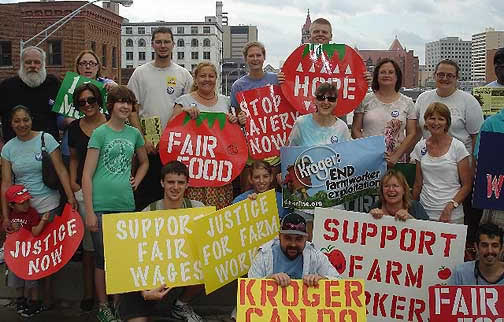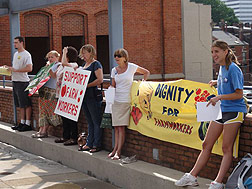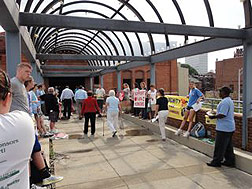
… by half-measures and corporate double-talk!
This past Thursday, Kroger executives and shareholders gathered in Cincinnati, Ohio, for what was supposed to be a light-hearted, festive affair celebrating the company’s economic success, marked by 30 consecutive quarters of sales growth. But the party was crashed (figuratively, mind you) by an exciting new Fair Food committee, Ohio Fair Food, whose members were determined to remind Kroger and its shareholders that those exciting profits come, in part, at the cost of unconscionable farmworker poverty and exploitation in Florida’s tomato fields.
Here below is a quick photo report from the event which, by the way, was Ohio Fair Food’s inaugural action (what a way to start!):
 Nearly 30 Ohioans — including a strong contingent from the Cincinnati Interfaith Workers Center — lined the pedestrian walkway leading into Cincinnati’s Music Hall… |
 … greeting shareholders and board members as they arrived for the meeting with colorful protest signs and flyers detailing Kroger’s failure to support the groundbreaking human rights standards established by the Campaign for Fair Food. |
 The members of Ohio Fair Food did the Campaign for Fair Food proud, amiably but forcefully pressing the case to shareholders of the urgent need for real, verifiable human rights reforms in Florida’s fields and of the key role that Kroger — the country’s second largest grocery company after WalMart — must play in ensuring that workers in its supply chain receive fair wages and humane working conditions. |
 The message was heard inside the meeting as well, where, as the Cincinnati News reported (“Kroger shareholders celebrate 30 years of growth,” 6/23/11):”… Kroger faced some scrutiny at the meeting from a group of nuns and a coalition of Florida tomato farm workers, who have been pressing the industry to adopt more stringent codes of conduct. A shareholder proposal on the conduct codes offered the local Sisters of Charity of Cincinnati was defeated. But Dillon [Kroger CEO David Dillon, pictured above in a photo from the Cincinnati News story] did address the matter, saying that his team had investigated working conditions at farms in Florida and planned to implement a new supplier audit. ‘It raises issues that are important to the company,’ he said.” |
In response to a question by Brigitte Gynther of CIW ally Interfaith Action, Mr. Dillon went on to say that the Campaign for Fair Food’s efforts are having a strongly positive effect in the industry and, in particular, on how the growers think about labor, adding, “You’ve really caused much more positive effect than you realize.”
But the Ohio Fair Food crew wasn’t buying what Mr. Dillon was selling that day, and that’s because they know that, while it is true the Campaign for Fair Food has indeed had a significant impact on farmworkers’ lives already, that impact is due solely to the contributions of the fast-food and foodservice industry leaders that have signed Fair Food agreements, not the supermarket industry (with the notable exception of Whole Foods). And that impact is still far from complete.
In no way does the progress made so far excuse the supermarket industry from doing its part to help end farmworker poverty and abuse. There is far too much work still to be done before workers can fully declare victory over the degradation of the past, work only the supermarket industry can do at this point. Indeed, as long as grocery chains like Mr. Dillon’s Kroger stubbornly stand on the sidelines while others carry all the weight, the promise of a true transformation of farm labor conditions will forever remain unfulfilled, and once again the supermarket giants will be responsible for cheapening the lives of the hard-working men and women who pick the produce they sell for steady profits, quarter after quarter after quarter.
No, the members of Ohio Fair Food were not moved by Kroger’s measured words of support and promises to audit its own supply chain. Instead, they vowed to continue pressing the fight for Fair Food in Kroger’s own corporate backyard, firm in their belief that Kroger can — and must — help lead the supermarket industry out of its shameful past of complicity in farmworker exploitation and into a modern era of truly humane farm labor standards.
Great job, Ohio Fair Food! We look forward to working together in the months ahead.
